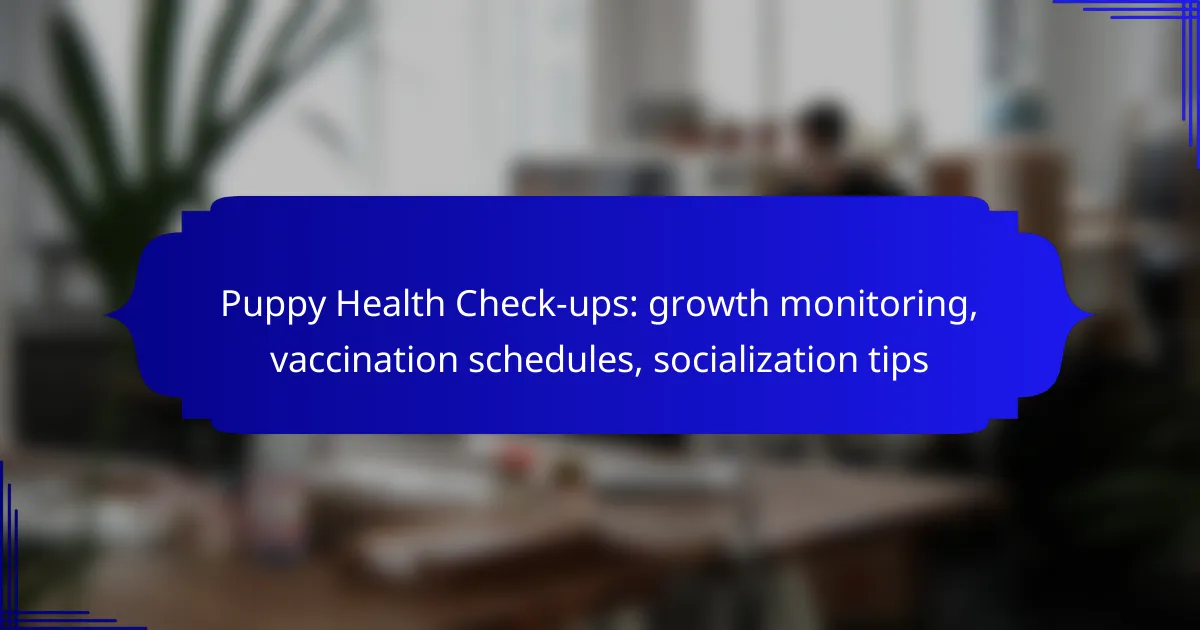Puppy health check-ups are crucial for monitoring growth, establishing vaccination schedules, and providing essential socialization tips. Regular veterinary visits during a puppy’s early months ensure they develop healthily and receive the necessary vaccinations to protect against infectious diseases. Understanding these components is vital for any responsible puppy owner aiming to promote their pet’s well-being.

What are the key components of puppy health check-ups in Australia?
Puppy health check-ups in Australia focus on growth monitoring, vaccination schedules, and socialization tips. These components are essential for ensuring a puppy’s overall health and development during their formative months.
Growth monitoring
Growth monitoring involves regular assessments of a puppy’s weight, height, and overall physical condition. Vets typically recommend check-ups every few weeks during the first few months to track growth patterns and ensure the puppy is developing appropriately.
During these visits, veterinarians may use growth charts to compare a puppy’s measurements against breed standards. This helps identify any potential health issues early, such as underweight or overweight conditions, which can affect long-term health.
Vaccination schedules
Vaccination schedules are crucial for protecting puppies from various infectious diseases. In Australia, puppies usually receive their first vaccinations between six to eight weeks of age, followed by booster shots at specific intervals until they are around 16 weeks old.
Common vaccinations include those for parvovirus, distemper, and hepatitis. Pet owners should consult their veterinarian to create a tailored vaccination plan that adheres to local regulations and best practices for their puppy’s breed and lifestyle.
Socialization tips
Socialization is vital for a puppy’s emotional and behavioral development. Early exposure to different environments, people, and other animals helps puppies become well-adjusted adults. Aim to introduce your puppy to various experiences between three to 14 weeks of age.
Consider enrolling your puppy in socialization classes or arranging playdates with other vaccinated dogs. Always supervise interactions and ensure that experiences are positive to build confidence and reduce fearfulness in new situations.

How often should puppies have health check-ups?
Puppies should have health check-ups frequently during their early months to ensure proper growth and development. Regular visits help monitor their health, establish vaccination schedules, and provide guidance on socialization.
Every 3-4 weeks until 16 weeks
Puppies need health check-ups every 3 to 4 weeks until they reach 16 weeks of age. These visits allow veterinarians to track growth, administer vaccinations, and check for any developmental issues. Early detection of health concerns is crucial for a puppy’s long-term well-being.
During these appointments, your vet will typically administer core vaccines, such as those for parvovirus, distemper, and adenovirus. It’s also an opportunity to discuss nutrition, behavior, and socialization strategies to ensure your puppy is thriving.
Every 6 months after 16 weeks
After reaching 16 weeks, puppies should continue to have health check-ups every 6 months. These visits help maintain their vaccination schedule and monitor overall health as they transition into adulthood. Regular check-ups can prevent potential health issues from becoming serious.
During these biannual visits, your veterinarian will assess your puppy’s growth, weight, and dental health. They may also recommend additional vaccinations and preventive care, such as flea and tick treatments, to keep your dog healthy and active.

What vaccinations do puppies need in Australia?
Puppies in Australia require a series of vaccinations to protect them from various infectious diseases. The core vaccinations include C3 and C5, with rabies vaccination being necessary for certain circumstances, especially for travel or specific regions.
C3 vaccination
The C3 vaccination is a fundamental immunization for puppies, covering canine distemper, hepatitis, and parvovirus. This vaccine is typically administered in a series starting at around six to eight weeks of age, with follow-up doses given every three to four weeks until the puppy is about 16 weeks old.
It is crucial to ensure that the puppy receives the C3 vaccine on schedule to build effective immunity. Consult your veterinarian for the specific timing and any additional recommendations based on your puppy’s health and lifestyle.
C5 vaccination
The C5 vaccination builds on the C3 by adding protection against kennel cough, which is caused by Bordetella bronchiseptica and other pathogens. This vaccine is particularly important for puppies that will be socialized in environments like dog parks, boarding facilities, or training classes.
The C5 vaccine is usually given after the initial C3 series, often around 10 to 12 weeks of age. Regular boosters are recommended to maintain immunity, especially if your puppy will be frequently exposed to other dogs.
Rabies vaccination
Rabies vaccination is not routinely required for puppies in Australia, as the country is considered rabies-free. However, if you plan to travel internationally or move to a region where rabies is present, your puppy may need this vaccination.
In such cases, the rabies vaccine should be administered at least 21 days before travel. Always check the specific requirements of your destination and consult with your veterinarian to ensure compliance with regulations.

What are the signs of a healthy puppy?
A healthy puppy typically exhibits a combination of good physical condition, active behavior, and proper socialization. Key indicators include maintaining a healthy weight, having clear eyes and a shiny coat, and displaying energetic and playful behavior.
Healthy weight
A healthy weight for puppies varies by breed and age, but generally, they should have a well-defined waist and ribs that are easily felt without excess fat. Regular weigh-ins can help monitor growth; consult your veterinarian for specific weight ranges based on your puppy’s breed.
To maintain a healthy weight, provide a balanced diet appropriate for puppies, and avoid overfeeding. Measure food portions and limit treats to prevent obesity, which can lead to health issues later in life.
Clear eyes and coat
Clear, bright eyes and a shiny coat are strong indicators of a puppy’s health. Eyes should be free of discharge and redness, while the coat should be clean, smooth, and free of parasites like fleas or ticks.
Regular grooming helps maintain coat health and allows for early detection of skin issues. Bathing should be done as needed, typically every few weeks, using gentle, puppy-safe shampoos.
Active behavior
Active behavior is a hallmark of a healthy puppy. They should be playful, curious, and eager to explore their environment. Lack of energy or reluctance to engage in play may signal underlying health issues.
Encourage physical activity through regular play sessions and socialization with other dogs. Aim for at least 30 minutes of exercise daily, adjusting based on your puppy’s age and breed. Monitor for signs of fatigue or distress during playtime.

What should I expect during a puppy health check-up?
During a puppy health check-up, you can expect a thorough evaluation of your puppy’s overall health, including physical examinations, vaccinations, and health advice tailored to your puppy’s needs. These check-ups are crucial for monitoring growth and ensuring your puppy develops healthily.
Physical examination
The physical examination is a comprehensive assessment where the veterinarian checks your puppy’s weight, coat condition, eyes, ears, and overall body structure. This evaluation helps identify any potential health issues early on.
During the exam, the vet will also listen to your puppy’s heart and lungs, check for any signs of parasites, and assess dental health. Regular physical examinations are vital, typically recommended every few months during the first year of your puppy’s life.
Vaccination administration
Vaccination administration is a key component of a puppy health check-up, protecting against various infectious diseases. Puppies usually receive their first vaccinations around six to eight weeks of age, with follow-up doses given at intervals until they are about four months old.
Common vaccinations include those for parvovirus, distemper, and rabies. It’s essential to adhere to the vaccination schedule recommended by your veterinarian to ensure your puppy is adequately protected.
Health advice
Health advice during a check-up often includes guidance on nutrition, exercise, and socialization. Your veterinarian can recommend appropriate puppy food and feeding schedules based on your puppy’s breed and size.
Socialization is also crucial; exposing your puppy to different environments, people, and other animals helps develop a well-adjusted adult dog. Your vet may suggest specific training classes or socialization opportunities to enhance your puppy’s development.
